
George Dewey Cukor was an American film director and producer. He mainly concentrated on comedies and literary adaptations. His career flourished at RKO when David O. Selznick, the studio's Head of Production, assigned Cukor to direct several of RKO's major films, including What Price Hollywood? (1932), A Bill of Divorcement (1932), Our Betters (1933), and Little Women (1933). When Selznick moved to Metro-Goldwyn-Mayer in 1933, Cukor followed and directed Dinner at Eight (1933) and David Copperfield (1935) for Selznick, and Romeo and Juliet (1936) and Camille (1936) for Irving Thalberg.

The Golden Globe Award for Best Director – Motion Picture is a Golden Globe Award that has been presented annually by the Hollywood Foreign Press Association, an organization composed of journalists who cover the United States film industry for publications based outside North America, since 1943.
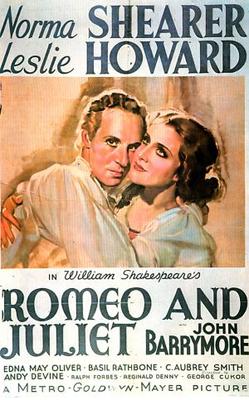
Romeo and Juliet is a 1936 American film adapted from the play by William Shakespeare, directed by George Cukor from a screenplay by Talbot Jennings. The film stars Leslie Howard as Romeo and Norma Shearer as Juliet, and the supporting cast features John Barrymore, Basil Rathbone, and Andy Devine.

My Cousin Rachel is a 1952 American romantic mystery film directed by Henry Koster and starring Olivia de Havilland, Richard Burton, Audrey Dalton, Ronald Squire, George Dolenz and John Sutton. The film is based on the 1951 novel of the same name by Daphne du Maurier.

Born Yesterday is a 1950 American comedy-drama film directed by George Cukor, based on the 1946 stage play of the same name by Garson Kanin. The screenplay was credited to Albert Mannheimer. According to Kanin's autobiography, Cukor did not like Mannheimer's work, believing it lacked much of the play's value, so he approached Kanin about adapting a screenplay from his own play. Because of legal entanglements, Kanin did not receive screen credit.

What Price Hollywood? is a 1932 American pre-Code drama film directed by George Cukor and starring Constance Bennett with Lowell Sherman. The screenplay by Gene Fowler, Rowland Brown, Jane Murfin and Ben Markson is based on a story by Adela Rogers St. Johns and Louis Stevens. The supporting cast features Neil Hamilton, Gregory Ratoff, Brooks Benedict, Louise Beavers and Eddie "Rochester" Anderson.
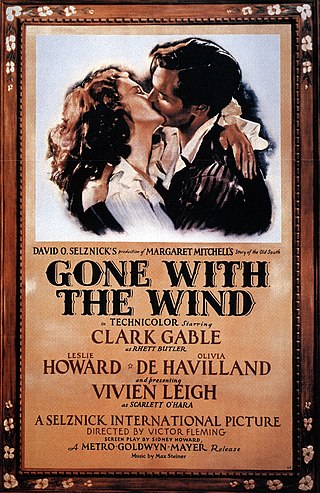
Gone with the Wind is a 1939 American epic historical romance film adapted from the 1936 novel by Margaret Mitchell. The film was produced by David O. Selznick of Selznick International Pictures and directed by Victor Fleming. Set in the American South against the backdrop of the American Civil War and the Reconstruction era, the film tells the story of Scarlett O'Hara, the strong-willed daughter of a Georgia plantation owner, following her romantic pursuit of Ashley Wilkes, who is married to his cousin, Melanie Hamilton, and her subsequent marriage to Rhett Butler.
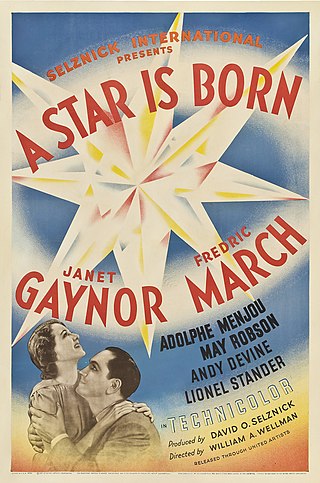
A Star Is Born is a 1937 American Technicolor drama film produced by David O. Selznick, directed by William A. Wellman from a script by Wellman, Robert Carson, Dorothy Parker, and Alan Campbell, and starring Janet Gaynor as an aspiring Hollywood actress, and Fredric March as a fading movie star who helps launch her career. The supporting cast features Adolphe Menjou, May Robson, Andy Devine, Lionel Stander, and Owen Moore.
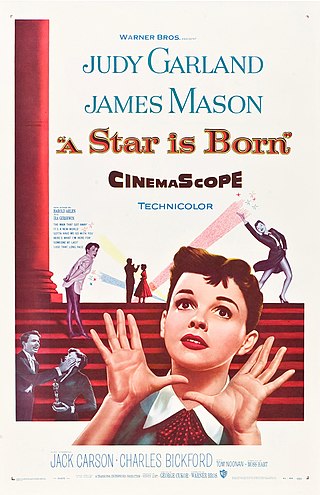
A Star Is Born is a 1954 American musical drama film directed by George Cukor, written by Moss Hart, and starring Judy Garland and James Mason. Hart's screenplay is an adaptation of the original 1937 film, based on the original screenplay by Robert Carson, Dorothy Parker and Alan Campbell, and from the same story by William A. Wellman and Carson, with uncredited input from six additional writers—David O. Selznick, Ben Hecht, Ring Lardner Jr., John Lee Mahin, Budd Schulberg and Adela Rogers St. Johns.
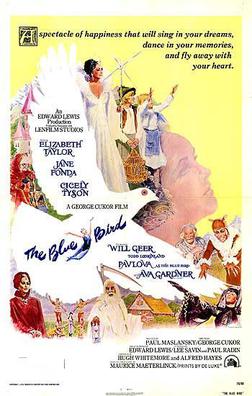
The Blue Bird is a 1976 American-Soviet children's fantasy film directed by George Cukor. The screenplay by Hugh Whitemore, Alfred Hayes, and Aleksei Kapler is based on the 1908 play L'Oiseau bleu by Maurice Maeterlinck. It was the fifth screen adaptation of the play, following two silent films, the studio's 1940 version starring Shirley Temple, and a 1970 animated feature. It was famous as one of the few cinematic co-productions between the United States and the Soviet Union during the Cold War. However unlike prior adaptations the film received little-to-no critical praise and was a flop at the box office.

Keeper of the Flame is a 1942 Metro-Goldwyn-Mayer (MGM) drama film directed by George Cukor, and starring Spencer Tracy and Katharine Hepburn.
The comedy of remarriage is a subgenre of American comedy films of the 1930s and 1940s. At the time, the Production Code, also known as the Hays Code, banned any explicit references to or attempts to justify adultery and illicit sex. The comedy of remarriage with the same spouse enabled filmmakers to evade this provision of the Code. The protagonists divorced, flirted with strangers without risking the wrath of censorship, and then got back together.
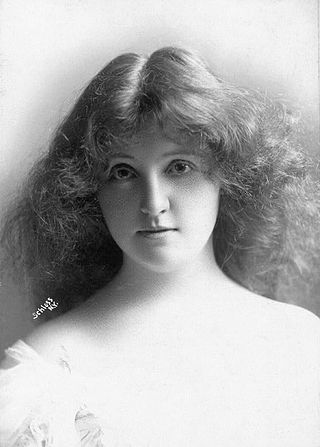
Laura Hope Crews was an American actress who is best remembered today for her later work as a character actress in motion pictures of the 1930s. Her best-known film role was Aunt Pittypat in Gone with the Wind.

Alice Adams is a 1935 romantic drama film directed by George Stevens and starring Katharine Hepburn. It was made by RKO and produced by Pandro S. Berman. The screenplay was by Dorothy Yost, Mortimer Offner, and Jane Murfin. The film was adapted from the novel Alice Adams by Booth Tarkington. The music score was by Max Steiner and Roy Webb, and the cinematography by Robert De Grasse. The film received Academy Award nominations for Best Picture and Best Actress.

Justine is a 1969 American drama film directed by George Cukor and Joseph Strick. It was written by Lawrence B. Marcus, based on the 1957 novel Justine by Lawrence Durrell, which was part of the series The Alexandria Quartet.

The Chapman Report is a 1962 American Technicolor drama film starring Shelley Winters, Jane Fonda, Claire Bloom and Glynis Johns. It was made by DFZ Productions and distributed by Warner Bros. It was directed by George Cukor and produced by Darryl F. Zanuck and Richard D. Zanuck, from a screenplay by Wyatt Cooper and Don Mankiewicz, adapted by Gene Allen and Grant Stuart from Irving Wallace's 1960 novel The Chapman Report. The original music was by Leonard Rosenman, Frank Perkins and Max Steiner, the cinematography by Harold Lipstein, the color coordination images and main title design by George Hoyningen-Huene, and the costume design by Orry-Kelly.

The Virtuous Sin is a 1930 American pre-Code comedy-drama film directed by George Cukor and Louis J. Gasnier and starring Walter Huston, Kay Francis, and Kenneth MacKenna. The screenplay by Martin Brown and Louise Long is based on the 1928 play The General by Lajos Zilahy. A separate 1931 German-language version The Night of Decision was shot at Paramount's Joinville Studios in Paris.
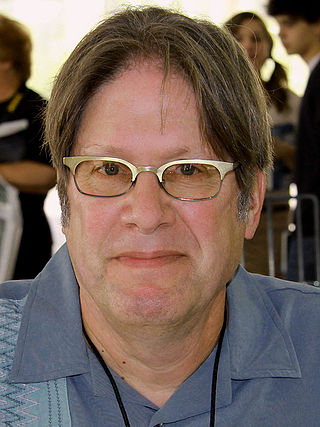
Patrick McGilligan is an Irish American biographer, film historian and writer. His biography on Alfred Hitchcock, Alfred Hitchcock: A Life in Darkness and Light was a finalist for the Edgar Award. He is the author of two New York Times Notable Books, and he lives in Milwaukee, Wisconsin. He is also noted for his biography on Clint Eastwood, Clint: The Life and Legend, which reveals much about Eastwood which his official biography by Richard Schickel left out. In addition to Hitchcock and Eastwood, he has written biographies on Robert Altman, James Cagney, George Cukor, Fritz Lang, Oscar Micheaux, Jack Nicholson, Nicholas Ray, Orson Welles and Mel Brooks. He is also an editor of Backstory, which features interviews of Hollywood screenwriters and is published by the University of California Press.
Gerald Ayres was an American film studio executive, producer and screenwriter. He is known for his work as producer of The Last Detail (1973) starring Jack Nicholson and as writer of Rich and Famous (1981) the last film directed by George Cukor.
A list of books and essays about Frank Capra:
















